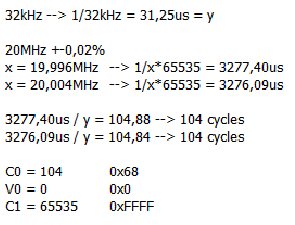Part Number: TDA3
Dear Experts,
assuming the following configuration:
- Reference Clock = 32kHz ; Test Clock = 20MHz; allowed deviation of Test Clock = 0.02%
I end up with a value of "0" for Valid0 counter. I am wondering about
1) Is it allowed to have a "0" for Valid0 or is at least a "1" value necessary for Valid0 counter in this case?
2) Is there a general limit with regards to the deviation accuracy?
Calculations:
Many thanks and best regards,
Gregor


